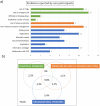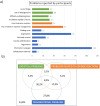Primary care pediatricians' involvement in influenza vaccination campaign in Italy
- PMID: 40847306
- PMCID: PMC12374418
- DOI: 10.1186/s13052-025-02093-6
Primary care pediatricians' involvement in influenza vaccination campaign in Italy
Erratum in
-
Correction: Primary care pediatricians' involvement in influenza vaccination campaign in Italy.Ital J Pediatr. 2025 Dec 13;51(1):317. doi: 10.1186/s13052-025-02179-1. Ital J Pediatr. 2025. PMID: 41390816 No abstract available.
Abstract
Background: In 2022, the Italian Ministry of Health extended free annual influenza vaccination to all children aged 6 months to 6 years. Since coverage remained low, the Emilia-Romagna region authorized primary care pediatricians (PCPs) to vaccinate both healthy and chronically ill children in 2023, with the aim of increasing vaccine uptake. This study aims to investigate factors influencing PCPs' participation in the 2023/24 influenza vaccination campaign in Emilia-Romagna, including perceived barriers and satisfaction among participant pediatricians.
Methods: An anonymous online survey was distributed between January 13-28, 2024, to all PCPs in Emilia-Romagna (N = 557), to evaluate participation in the 2023/24 pediatric influenza vaccination campaign. The survey explored demographic and professional information, vaccination practices and training, and perceived campaign impact and satisfaction. Outcome variables included campaign participation, perceived problems and satisfaction levels. Logistic regression models to assess determinants of participation and Cochran-Armitage test to explore trends in satisfaction levels were used.
Results: 319 PCPs (57.2% of total) responded to the survey, of which 223 (70.8%) joined the campaign. The number of patients in care, working in group clinic vs. single PCP clinic (OR 2.45), experience as vaccinator (OR 3.12) and PCP's anti-flu vaccination (OR 1.94) were positively associated with participation; age, training at post-graduate school (OR 0.54) and self-reported competence in vaccination (OR 0.62) were negatively associated with participation. Among non-participants, only 25% reported at least one difficulty, mainly lack of fridge or emergency kit and fear of managing adverse reactions; among participants, 85% reported at least one problem, mostly related to limited communication campaigns, organization and fear of managing adverse reactions. Satisfaction levels were higher among male PCPs, those with experience as vaccinators, who vaccinated more children, and those with shorter administration times. The main reasons for dissatisfaction were related to the organization time, and lack of information for parents and economic advantage.
Conclusions: This study highlights the barriers that must be removed to achieve effective PCPs' involvement in the vaccination campaign. Future strategies should focus on strengthening logistical support, tailored training and parent communication, and promoting shared models of care to enhance effectiveness and sustainability of vaccination programs.
© 2025. The Author(s).
Conflict of interest statement
Declarations. Ethics approval and consent to participate: The survey was promoted by the Reggio Emilia PCPs and received the endorsement of the Reggio Emilia LHA and the PCP associations of all the region who agreed to forward the survey to their associated as routine activity for planning next campaign. Given the complete anonymization of the data collected and the observational design, the study did not require ethical approval in accordance with Italian law (Gazzetta Ufficiale no. 76, dated March 31, 2008). Consent for publication: Not applicable. Competing interests: The authors declare that they have no competing interests.
Figures


References
-
- Seasonal influenza vaccination and antiviral use in EU/EEA Member States. https://www.ecdc.europa.eu/en/publications-data/seasonal-influenza-vacci.... Accessed 21 April 2025.
-
- Istituto superiore di Sanità. Influenza. Raccomandazioni del ministero della Salute. https://www.epicentro.iss.it/influenza/raccomandazioni-ministero. Accessed 21 April 2025.
-
- World Health Organization. Influenza (seasonal). https://www.who.int/news-room/fact-sheets/detail/influenza-(seasonal). Accessed 21 April 2025.
-
- Fisher WA, Gilca V, Murti M, Orth A, Garfield H, Roumeliotis, et al. Continuing medical education improves physician communication skills and increases likelihood of pediatric vaccination: findings from the pediatric influenza vaccination optimization trial (PIVOT)—II. Vaccines. 2023;11:17. - PMC - PubMed
MeSH terms
Substances
LinkOut - more resources
Full Text Sources
Medical

